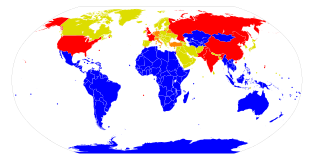Related Research Articles

The foreign relations of New Zealand are oriented chiefly toward developed democratic nations and emerging Pacific Island economies. Until the late 20th century, New Zealand aligned itself strongly with the United Kingdom and had few bilateral relationships with other countries. From the latter half of the 20th century, Australia has been New Zealand's most important cultural, economic and military partner. Today, the country participates in several multilateral political organisations, including Asia-Pacific Economic Cooperation, the Pacific Community, and the Pacific Islands Forum. New Zealand has been described as an emerging power; however, such a claim needs to be considered in the context of its medium-sized economy and limited military capability. The country's major political parties have generally agreed on the broad outlines of foreign policy, and the government has been active in promoting free trade, nuclear disarmament, and arms control.

The Treaty on the Non-Proliferation of Nuclear Weapons, commonly known as the Non-Proliferation Treaty or NPT, is an international treaty whose objective is to prevent the spread of nuclear weapons and weapons technology, to promote cooperation in the peaceful uses of nuclear energy, and to further the goal of achieving nuclear disarmament and general and complete disarmament. Between 1965 and 1968, the treaty was negotiated by the Eighteen Nation Committee on Disarmament, a United Nations-sponsored organization based in Geneva, Switzerland.

Nuclear disarmament is the act of reducing or eliminating nuclear weapons. Its end state can also be a nuclear-weapons-free world, in which nuclear weapons are completely eliminated. The term denuclearization is also used to describe the process leading to complete nuclear disarmament.
Arms control is a term for international restrictions upon the development, production, stockpiling, proliferation and usage of small arms, conventional weapons, and weapons of mass destruction. Arms control is typically exercised through the use of diplomacy which seeks to impose such limitations upon consenting participants through international treaties and agreements, although it may also comprise efforts by a nation or group of nations to enforce limitations upon a non-consenting country.

Disarmament is the act of reducing, limiting, or abolishing weapons. Disarmament generally refers to a country's military or specific type of weaponry. Disarmament is often taken to mean total elimination of weapons of mass destruction, such as nuclear arms. General and Complete Disarmament was defined by the United Nations General Assembly as the elimination of all WMD, coupled with the “balanced reduction of armed forces and conventional armaments, based on the principle of undiminished security of the parties with a view to promoting or enhancing stability at a lower military level, taking into account the need of all States to protect their security.”

The Seabed Arms Control Treaty is a multilateral agreement between the United States, Soviet Union, United Kingdom, and 91 other countries banning the emplacement of nuclear weapons or "weapons of mass destruction" on the ocean floor beyond a 12-mile (22.2 km) coastal zone. It allows signatories to observe all seabed "activities" of any other signatory beyond the 12-mile zone to ensure compliance.
The New Agenda Coalition (NAC), composed of Brazil, Egypt, Ireland, Mexico, New Zealand and South Africa, is a geographically dispersed group of middle power countries seeking to build an international consensus to make progress on nuclear disarmament, as legally called for in the nuclear NPT.

The United Nations Institute for Disarmament Research (UNIDIR) was established in 1980 by the United Nations General Assembly to inform States and the global community on questions of international security, and to assist with disarmament efforts so as to facilitate progress toward greater security and economic and social development for all.

The Australia, New Zealand, United States Security Treaty is a 1951 non-binding collective security agreement initially formed as a trilateral agreement between Australia, New Zealand, and the United States; and from 1986 an agreement between New Zealand and Australia, and separately, Australia and the United States, to co-operate on military matters in the Pacific Ocean region, although today the treaty is taken to relate to conflicts worldwide. It provides that an armed attack on any of the three parties would be dangerous to the others, and that each should act to meet the common threat. It set up a committee of foreign ministers that can meet for consultation.

In 1987, the Fourth Labour Government passed the New Zealand Nuclear Free Zone, Disarmament and Arms Control Act. The Act essentially declared New Zealand as a nuclear free zone. The purpose of the Act was ambitious and wide-ranging: “to establish in New Zealand a Nuclear Free Zone, to promote and encourage an active and effective contribution by New Zealand to the essential process of disarmament and international arms control”.
In 1984, Prime Minister David Lange banned nuclear-powered or nuclear-armed ships from using New Zealand ports or entering New Zealand waters. Under the New Zealand Nuclear Free Zone, Disarmament, and Arms Control Act 1987, territorial sea, land and airspace of New Zealand became nuclear-free zones. This has since remained a part of New Zealand's foreign policy.

The UN Office for Disarmament Affairs (UNODA) is an Office of the United Nations Secretariat established in January 1998 as the Department for Disarmament Affairs, part of United Nations Secretary-General Kofi Annan's plan to reform the UN as presented in his report to the General Assembly in July 1997.
The 13 steps are identified in a paragraph of the Final Document of the 2000 Review Conference of the Nuclear Non-Proliferation Treaty, providing a set of 'practical steps for the systematic and progressive efforts to implement Article VI of the Treaty on the Non-Proliferation of Nuclear Weapons'. Article VI is the part of the Treaty that provides for disarmament, including nuclear disarmament.

Ukraine, an important republic of the former Union of Socialist Soviet Republics (USSR) from 1922–91, once hosted Soviet nuclear weapons and delivery systems on its territory. Together with Russia, Ukraine was a part of the former Soviet Union but its population voted overwhelmingly for independence in 1991, which ended any realistic chance of the Soviet Union staying together even on a limited scale.
The International Luxembourg Forum on Preventing Nuclear Catastrophe — is an international non-governmental organisation uniting leading world-renowned experts on non-proliferation of nuclear weapons, materials and delivery vehicles.
Iran convened a conference titled "International Disarmament and Non-proliferation: World Security without Weapons of Mass Destruction" on 17 and 18 April 2010 in Tehran. The theme of the conference was Nuclear Energy for All, Nuclear Weapons for No One.
The 2010 Review Conference for the Treaty on the Non-Proliferation of Nuclear Weapons (NPT) was held at United Nations Headquarters in New York City from 3 to 28 May 2010. The President of the Review Conference is Ambassador Libran N. Cabactulan of the Philippines. UN Secretary-General Ban Ki-moon used the opening of the conference to note that "sixty five years later, the world still lives under the nuclear shadow".

The Middle East nuclear weapon free zone (MENWFZ) is a proposed agreement similar to other nuclear-weapon-free zones. Steps towards the establishment of such a zone began in the 1960s led to a joint declaration by Egypt and Iran in 1974 which resulted in a General Assembly resolution. Following the 1995 NPT Review Conference, the International Atomic Energy Agency (IAEA) held a series of meetings involving experts and academics to consider ways to advance this process.
The Humanitarian Initiative is a group of states that evolved within the framework of the Nuclear Non-Proliferation Treaty (NPT) and nuclear weapons diplomacy more widely. 159 states subscribed to the last iteration of the initiative's Joint Statement in 2015. Since 2013, it led to a series of conferences exploring the Humanitarian Impact of Nuclear Weapons, culminating in the Humanitarian Pledge, issued by the Austrian Government, to "fill the legal gap for the prohibition and elimination of nuclear weapons". The Pledge has been endorsed by 108 governments as of 1 June 2015. The Humanitarian Initiative is seen as a direct answer to the lack of progress in nuclear disarmament.
References
- ↑ Westberg, Gunnar (May 21, 2013). "Carl Bildt — Is he serious?".
- 1 2 Joint Declaration by the Ministers for Foreign Affairs 1998-06-09
- ↑ "Nuclear Weapon Reduction | Disarmament of Nuclear Weapons | NTI".
- ↑ Andrews, D. (1998, June 9). The Acronym Institute for Disarmament Diplomacy. Joint Declaration by the Ministers for Foreign Affairs of Brazil, Egypt, Ireland, Mexico, New Zealand, Slovenia, South Africa and Sweden. 'A Nuclear-Weapons-Free World: The Need for a New Agenda.' Speech delivered in Dublin, Ireland. Retrieved from http://www.acronym.org.uk/27state.htm Archived 2005-05-13 at the Wayback Machine
- ↑ New Zealand Nuclear Free Zone, Disarmament, and Arms Control Act (1987). Retrieved from the Parliamentary Counsel Office—New Zealand Legislation website: http://www.legislation.govt.nz/act/public/1987/0086/latest/whole.html#DLM115138